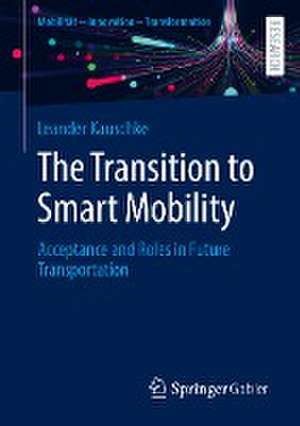The Transition to Smart Mobility: Acceptance and Roles in Future Transportation: Mobilität – Innovation – Transformation
Autor Leander Kauschkeen Limba Engleză Paperback – 20 oct 2023
Study 2 applies the Institutional Role Model (IRM) to better understand system dynamics. Thus, the smart mobility ecosystem is mapped in a structured manner. It identifies nine institutions, as well as four technical and four economic roles. Results of interviews with experts (N=8) support the IRM’s significance as a vision provider for a new mobility regime. In the end, these two perspectives amalgamate. This opens a sophisticated space for public debate about the commencing transition to smart mobility.
Preț: 583.93 lei
Preț vechi: 686.97 lei
-15% Nou
Puncte Express: 876
Preț estimativ în valută:
111.73€ • 121.75$ • 94.15£
111.73€ • 121.75$ • 94.15£
Carte tipărită la comandă
Livrare economică 23 aprilie-07 mai
Preluare comenzi: 021 569.72.76
Specificații
ISBN-13: 9783658430009
ISBN-10: 3658430001
Pagini: 294
Ilustrații: XXII, 294 p. 54 illus., 1 illus. in color. Textbook for German language market.
Dimensiuni: 148 x 210 mm
Greutate: 0.42 kg
Ediția:1st ed. 2023
Editura: Springer Fachmedien Wiesbaden
Colecția Springer Gabler
Seria Mobilität – Innovation – Transformation
Locul publicării:Wiesbaden, Germany
ISBN-10: 3658430001
Pagini: 294
Ilustrații: XXII, 294 p. 54 illus., 1 illus. in color. Textbook for German language market.
Dimensiuni: 148 x 210 mm
Greutate: 0.42 kg
Ediția:1st ed. 2023
Editura: Springer Fachmedien Wiesbaden
Colecția Springer Gabler
Seria Mobilität – Innovation – Transformation
Locul publicării:Wiesbaden, Germany
Cuprins
Introduction.- The user perspective.- The institutional perspective.- Conclusion.- Reference.
Notă biografică
About the author
Leander Kauschke conducts research on issues related to the mobility of the future. He is particularly interested in problems that arise at the crossroads of politics, business and society and transcend purely technological considerations.
Leander Kauschke conducts research on issues related to the mobility of the future. He is particularly interested in problems that arise at the crossroads of politics, business and society and transcend purely technological considerations.
Textul de pe ultima copertă
Most contemporary notions of the fairly recent concept ‘smart mobility’ portray an imminent transition of similar socio-economic consequences as the shift from horses to automobiles did 100 years ago. Present book thus offers an in-depth look at the variables involved in the equation of smart mobility acceptance (1) and envisaged institutional change (2).
Both views are embedded in the Multi-Level Perspective. Study 1 develops a structural equation model in SmartPLS. Use cases cover eBikes (N=537), mobility-as-a-service (N=531), and fully automated vehicles (N=558). Based on the results, acceptance relies on five factors: performance expectancy, facilitating conditions, social influence, habit, and hedonic motivation.
Study 2 applies the Institutional Role Model (IRM) to better understand system dynamics. Thus, the smart mobility ecosystem is mapped in a structured manner. It identifies nine institutions, as well as four technical and four economic roles. Results of interviews with experts (N=8) support the IRM’s significance as a vision provider for a new mobility regime. In the end, these two perspectives amalgamate. This opens a sophisticated space for public debate about the commencing transition to smart mobility.
About the author
Leander Kauschke conducts research on issues related to the mobility of the future. He is particularly interested in problems that arise at the crossroads of politics, business and society and transcend purely technological considerations.
Study 2 applies the Institutional Role Model (IRM) to better understand system dynamics. Thus, the smart mobility ecosystem is mapped in a structured manner. It identifies nine institutions, as well as four technical and four economic roles. Results of interviews with experts (N=8) support the IRM’s significance as a vision provider for a new mobility regime. In the end, these two perspectives amalgamate. This opens a sophisticated space for public debate about the commencing transition to smart mobility.
About the author
Leander Kauschke conducts research on issues related to the mobility of the future. He is particularly interested in problems that arise at the crossroads of politics, business and society and transcend purely technological considerations.
